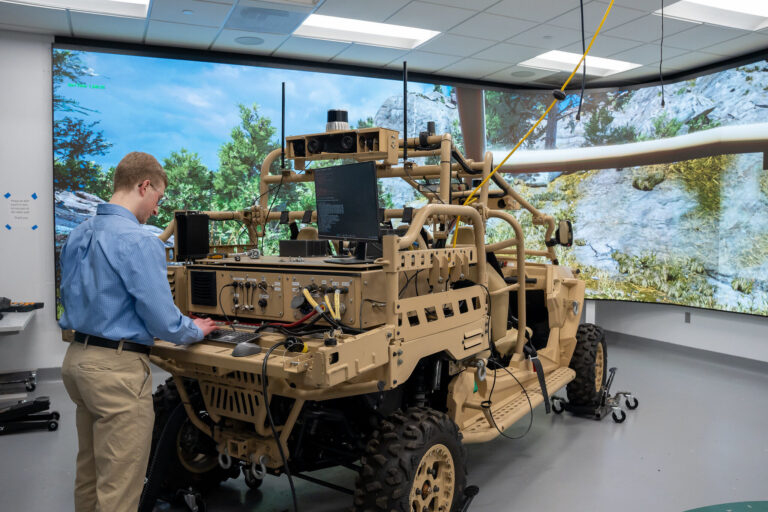The US Army has extended its long-running relationship with the University of Michigan’s Automotive Research Center, reaching a new five-year, agreement of up to US$100 million to boost work on autonomous vehicle technologies.
This potentially doubles the federal government’s financial investment with ARC since the last agreement, reached in 2019. Following its 1994 launch, the ARC has served as a source of technology and first-in-class modeling and simulation for the Army’s fleet of vehicles—the largest such fleet in the world.
“We are driving the development of modern mobility systems with our advanced modeling and simulation methods, such as high-fidelity synthetic environments, virtual vehicle prototypes and virtual reality tools for human-autonomy teaming,” said ARC director Bogdan Epureanu, the Roger L. McCarthy Professor of Mechanical Engineering and professor of electrical engineering and computer science.
“The cost and time needed to collect data through physical experimentation is prohibitive, and the amount of data needed to enable autonomous operation in off-road, military, emergency or disaster relief scenarios is thousands of times larger than that needed for operation in cities. Cutting-edge modeling and simulation approaches such as the ones developed in the ARC provide a critical solution to this enormous challenge.”
The 14-member collection of universities and institutes, led by U-M, features a total of 84 faculty members, 34 industry partners and four government agencies. It is an ecosystem of research and innovation devoted to transforming ground system technologies.
“The University of Michigan’s Automotive Research Center provides invaluable research and partnership to the U.S. Army that has helped propel the development of next-generation ground vehicle systems and other technologies vital to our men and women in uniform,” said U.S. Sen. Gary Peters. “As a member of the Senate Armed Services Committee, I have repeatedly fought to ensure the ARC receives the support and resources it needs to continue this important work, and I welcome this news that it will remain an essential partner to the U.S. Army for years to come.”
In the earliest years of the ARC’s partnership, the bulk of its research focused on energy and powertrain issues. That work led to advances such as accurate modeling of combat personnel and their gear to assist with vehicle design, engine designs and performance simulations, blast modeling and simulation techniques, as well as a better understanding of lithium ion battery performance and design.
Some of the results cross over from military to civilian applications, such as digital engineering for reliability-based optimization of vehicle safety. Ramdo Solutions offers vehicle design tools based on technology developed at ARC.
In recent years, ARC’s focus has shifted toward autonomous technologies that have become increasingly important to the military and beyond.
“The ARC is the Army’s Center of Excellence in Modeling and Simulation,” said David Gorsich, Army chief scientist for ground vehicles. “The research it conducts is crucial to developing the next generation of digital engineering tools to be used by government and industry.
“Using the latest digital engineering tools allows the Army community to design and develop advanced vehicle systems quickly and efficiently, bringing modern capabilities to our soldiers. These modern ground vehicles are more complex than ever before, requiring modern analysis and design tools. They are fuel-efficient, survivable, reliable, semi-autonomous and software-intensive systems. These characteristics reduce our logistical burden while increasing operational effectiveness.”
The ARC brings together researchers working in engineering, machine learning, human factors and social behavior. And it fits within U-M’s broader mission of exploring the future of mobility—from autonomous and connected vehicle technology to battery research for electric vehicles.
Participating institutions include: the University of Iowa; Wayne State University; Clemson University; Oakland University; Virginia Tech; Michigan Technological University; Mississippi State University; the University of Alabama at Birmingham; the University of California, Irvine; George Mason University; Central Michigan University; Michigan State University and Worcester Polytechnic Institute.


